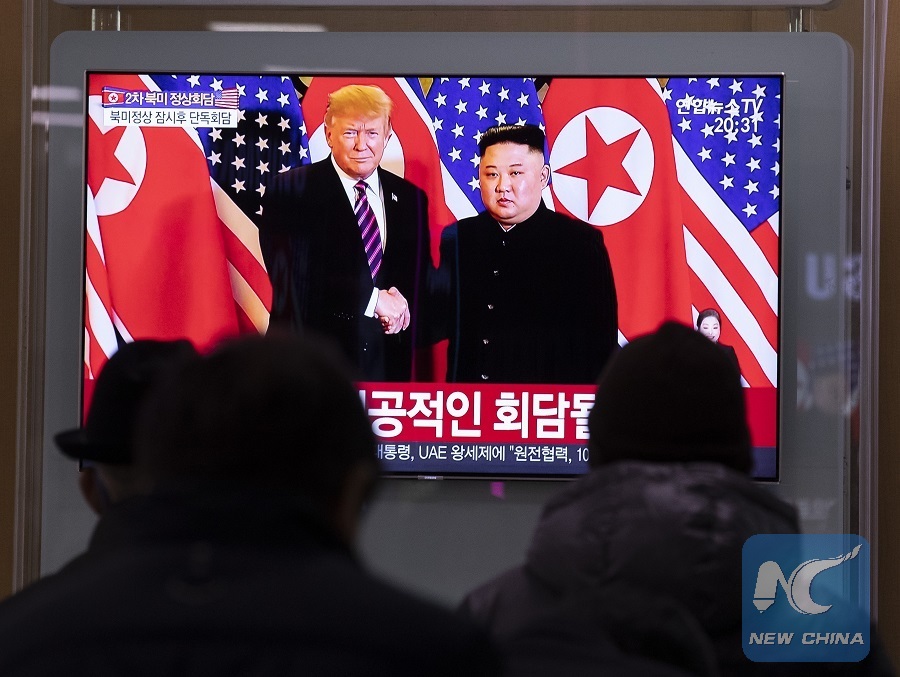
People watch a TV live broadcast on top leader of the Democratic People's Republic of Korea(DPRK) Kim Jong Un meeting with U.S. President Donald Trump in Seoul, South Korea, Feb. 27, 2019. (Xinhua/Lee Sang-ho)
SEOUL, March 4 (Xinhua) -- South Korean President Moon Jae-in expressed hope on Monday that the Democratic People's Republic of Korea (DPRK) and the United States could continue their talks to strike a deal on denuclearization of the Korean Peninsula "in the end."
Moon made the remarks during a plenary session of the National Security Council (NSC), according to the presidential Blue House.
The NSC meeting was chaired by Moon in about nine months since he presided it over on June 14 2018, two days after the first summit between top DPRK leader Kim Jong Un and U.S. President Donald Trump in Singapore.
Kim and Trump ended their second meeting in the Vietnamese capital of Hanoi last week without any agreement.
"We wish the two countries continue talks. (We) anticipate the two leaders meet again as soon as possible to strike the delayed deal," said Moon.
Moon said it would never be desirable for Pyongyang and Washington to halt dialogue for long, and he believed that the two sides would reach an agreement "in the end."
He said South Korea could play a significant role in helping the two sides strike a deal, indicating his willingness to broker a compromise between the DPRK and the United States.
The president instructed the NSC to make efforts for the rapid resumption of working-level talks between Pyongyang and Washington, and try their best to find measures contributing to the DPRK-U.S. dialogue resumption through the development of inter-Korean relations without violating international sanctions.
The NSC meeting was attended by prime minister, ministers of foreign affairs, unification and defense, intelligence agency chief, presidential chief of staff, top national security advisor and secretaries for security and foreign affairs.
Moon said the second DPRK-U.S. summit confirmed "very important fruits" that the two sides bore through dialogue, noting that Kim and Trump discussed the dismantlement of the DPRK's Yongbyon nuclear complex.
He said the verifiable dismantlement of the Yongbyon nuclear facility, which he said is a core of the DPRK's nuclear program, was within a possible range.
If all the plutonium-reprocessing and uranium-enrichment facilities in Yongbyon are completely dismantled, it will mark an irreversible phase for the peninsula's denuclearization, Moon noted.
Moon said relief from sanctions against Pyongyang was also discussed at the Hanoi summit, which he called a great progress as it meant the two sides entering a phase of trading denuclearization and corresponding measures.
During the Hanoi summit, Kim and Trump discussed the establishment of U.S. liaison office in Pyongyang that has a "great meaning" in the process going toward normalized relations between the DPRK and the United States, the South Korean leader noted.
What is different from the past, Moon said there has been neither condemnation from either side nor tensions raised even after the DPRK and the United States ended their talks without any deal.
Moon said the leaders of the DPRK and the United States expressed their unwavering trust to each other and made clear their willingness to continue talks to strike a deal.
It indicated the second Kim-Trump summit was in the process of going toward a greater agreement, though it takes time, Moon added.

